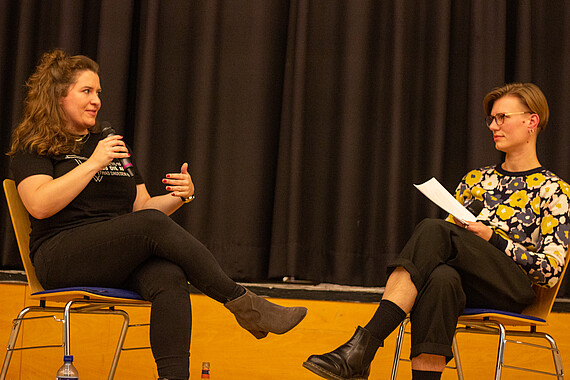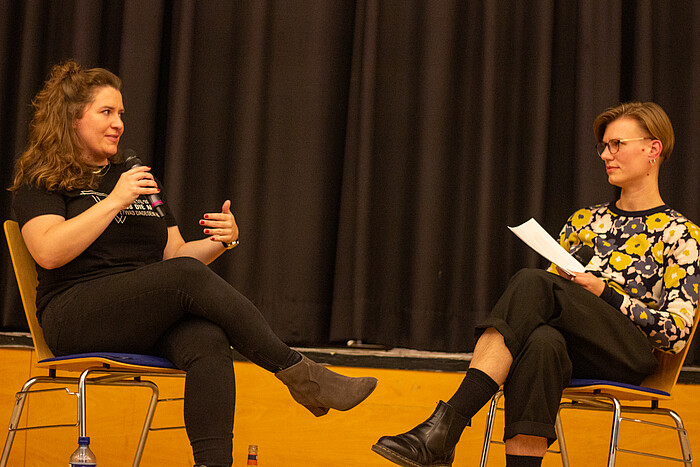

 ©
Felix Brinker
©
Felix Brinker
Madita Oeming is a German cultural studies scholar who has specialized in the field of porn studies. She received her Master’s degree in American Studies at the University of Göttingen with a master thesis entitled “Moby’s Dick.” Her work on this project introduced Madita Oeming to the field of porn studies, which continues to be the focus of her work and research today. She taught American literature and cultural history as well as the first seminar on porn at the Institute of American Studies at the University of Paderborn. Since then, she has appeared on various stages and in various media – from print to radio and television – to shape the public discourse about pornography. Madita Oeming has published in academic journals like Porn Studies, given lectures across Germany as well as on the international stage, and taught at several German universities, including Paderborn, Münster, and Berlin. In the context of the Teach LOVE sexual education project at the University of Flensburg, she offered a “driver’s license” for watching porn. In addition, Madita Oeming was a guest on the television show Talk aus Berlin, moderated Sex Talk Tuesday for the porn website Sssh.com, and acted as a jury member for the Pornfilmfestival Berlin.
As part of the WortLaut festival, Anna-Lena Oldehus invited Madita Oeming to talk about her personal experience within the university, about the subject of pornography, and her relationship with academia in general – including what she loves about it, her struggles with it, and what she thinks it lacks. The following is an excerpt of a much longer interview.
Anna-Lena Oldehus: What do you love about working in academia?
Madita Oeming: I now realize that, having done so much journalism and so many ‘you have two minutes of radio time to explain something’ things, I love the depth of academic work. The complexity, the cleanliness, the carefulness. Especially with complex topics, tied into great narratives and ambivalences. To have things organized, in black and white, with citations (laughs), there’s something very calming about that. That’s what I like about scholarly work. When you really think about writing processes and the deep immersion in particular subject. To really deal with a topic for a long time and to lose yourself in all kinds of research. Sometimes you really get into a gold-digger mode and I love that. And when you think of scholarly work more generally, teaching was or is something I always enjoy, except for when I’m correcting papers (laughs). Because you can just get into the exchange of ideas. Especially with my topic it’s so rewarding to get into a group of young people and just watch how their heads are spinning, how they question their worldview. I find that very, very rewarding.
Anna-Lena Oldehus: Is the academic space a difficult space for self-love?
Madita Oeming: Absolutely. Because it’s just not a space that leaves a lot of room for personal needs. Like, self-love in the most basic sense of ‘I take care of myself’ means: I sleep, I eat healthy, I’m active, I get fresh air. So, concerning the working process there is already a lot of sitting and screen time, oftentimes alone, a lot of pressure, and there are no fixed working hours. There are always unspoken laws about what you have to achieve that you can never adhere to. You’re never really done and you’re somehow always too late with everything. It’s practically already set up in such a way that nobody sticks to a deadline when it comes to submitting publications and so on. I almost think that this whole system is, in many aspects, so stress-oriented. It’s extremely difficult to somehow maintain healthy routines through it all. In that respect, I think it is a difficult space for self-love. And of course, there’s a lot of competition, especially if you’re in the humanities, where there is little funding, few positions, and everyone is in a relationship of dependency.
Anna-Lena Oldehus: During your time in and on your way into academia, were there certain texts or scholars that inspired you? Any ‘academic rock stars’ that you idolized a little bit?
Madita Oeming: Well, not necessarily ‘rock stars.’ I mean, it’s a question of how you define that, right? (laughs) It’s more in the small encounters. More in seminars, with someone who then somehow really infected me with an enthusiasm for a topic. For me, a rock star is Professor Greta Olson from the University of Gießen. When she went on stage for the first time, she just took over the whole stage with such an American omnipresence and said: “I’m tenured, I’m gonna do whatever the fuck I want.” And we were just like: ‘Wow. Fuck yeah.’ That spirit just got to you right away. She’s so not afraid of a loss of authority. I was in her seminar once, for a guest session, and it was Thanksgiving and she just walked in with a turkey hat on her head. I was so in awe of her then because she wasn’t even a bit inconsistent in her demeanor or less serious that day. I thought that was insanely impressive. With things like that, you can seriously impress me. (laughs)
Anna-Lena Oldehus: I think she was at a conference that one time, sitting in the panel, right? She sat next to me and I was instantly super nervous. A person with infinite charisma. And I would still have been nervous, even if she had a turkey hat on.
Madita Oeming: Definitely. And at the same time, she’s warm and empathetic. I find that rare in academic role models. To me, this shows that it doesn’t always have to be: have success and demand respect in this uncomfortable, toxic manner. She is such a supportive person, and I’ve only met a small handful of people like that in the years that I moved in those academic circles. But you really need those kind of people.
Anna-Lena Oldehus: Now that you’ve left the university, how much did your working life change? I’d guess you still work alone most of the time?
Madita Oeming: It is different now that I’m self-employed but only recently so. I guess I’m not a perfect example as I’m still teaching every now and then. But it’s a lot easier to work interdisciplinarily in the media and outside of university. I get invited a lot more to conferences in, for example, the medical field. I’m really enjoying this a lot. My schedule now is quite strange, one day I’m at the erotic fair and the next I’m giving a talk in a therapeutic context. It’s both exiting and exhausting to be in so many different worlds at the same time, it’s demanding and liberating. Sometimes I feel insecure about having to write in a more accessible, popular science manner and not in the academic way I’m used to. But overall, I know that I wouldn’t be able to do the media work I’m doing now without my academic background. So, I don’t regret the path I took.
Anna-Lena Oldehus: So, would you recommend pursuing a career in academia?
Madita Oeming: Yes and no, I don’t think there is a universal answer to that. It always depends on circumstances, motivation, and the like. Studying is also different from deciding to really work in academia. If you make that choice, I’d always recommend also experiencing something else, maybe getting a job as a waiter or something. Because there are people that do their PhD and never experience life outside of university, and it can be difficult to then connect to ‘normal life’. It also gives you another sense of security to know that, through other work experience, you can find employment beyond the restrictive academic field.
Copyright (c) 2023 Elisa Bongartz and Evelyn Dossa.
This work is licensed under a Creative Commons Attribution 4.0 International License


